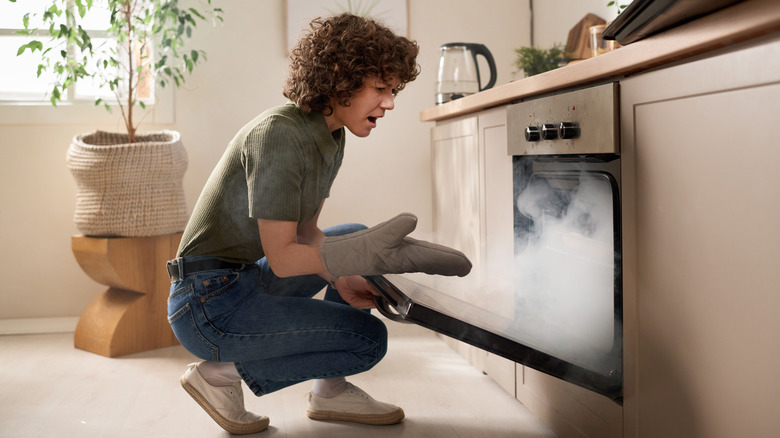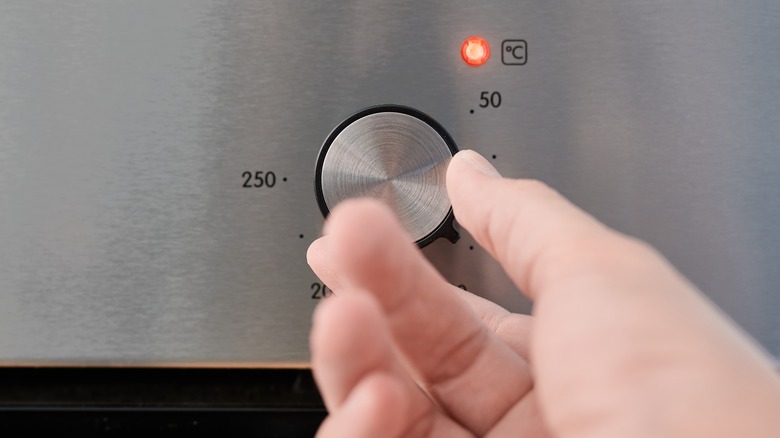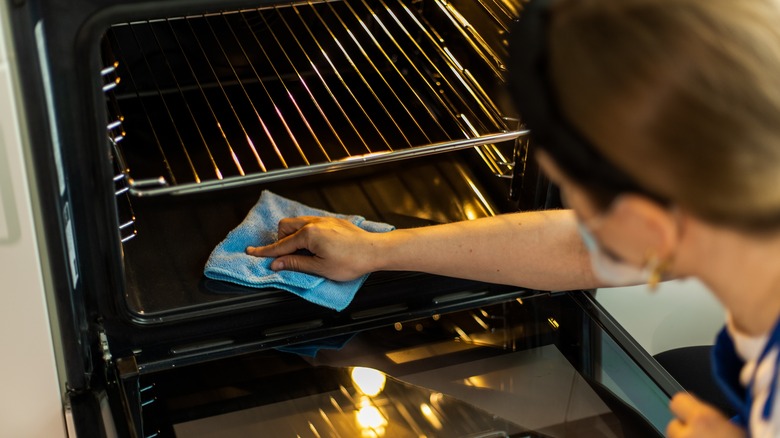Why Is Your Oven Overheating And How Can You Stop It From Happening?
Cooked meat that's dry and dark brown baked goods that are a step away from being called burnt may not always mean that you're an inept cook. So, before you blame yourself and resolve to achieve culinary perfection, you might want to turn toward your oven and check whether it's overheating in the background and ruining your dishes. There can be several reasons why the appliance is sabotaging (unintentionally, of course) your dishes. For instance, a dirty oven with a blocked vent, faulty heating elements, and a disoriented temperature sensor can cause your oven to overheat.
Although important, they aren't the only reasons why your oven is acting strange. The appliance's thermostat might be culpable. To ascertain why your oven isn't cooking food evenly, place an oven-safe thermometer in the middle zone. Now, preheat the appliance by turning the thermostat knob to set the preferred temperature. Once the time is up, check the reading on the thermometer to find the actual inner temperature. This will help you gauge the temperature your oven generally assumes after you turn it on. While it's not a big deal if the actual and displayed temperature differ by a few degrees, your thermostat might be at fault if the difference is over 15 degrees. Finding the actual reason requires some trial and error. But the good news is you can troubleshoot most of the minor issues yourself, like cleaning the oven, to get it back in running shape.
Reasons your oven is overheating
Start by checking if your oven is calibrated adequately. This means the oven's internal temperature should match the setting. If it doesn't, a recalibration is just what the doctor ordered. Another reason why your oven might be overheating is if the temperature sensor isn't functioning as desired. The sensor keeps track of the internal temperature and indicates the thermostat to crank or turn down the heating elements. A faulty sensor won't read the temperature right and often estimates it lower than it is. This will cause the heating elements to keep working to cook the food, ultimately charring it.
Moreover, a defective thermostat won't gauge the temperature correctly, which can lead to overheating. The culprit could also be a loose or damaged thermostat knob as the displayed temperature and the degree the oven reads can vary drastically. Alternatively, issues with the heating element might be causing your oven to malfunction. A damaged heating element usually gives off more heat than necessary to cook the dishes, burning them in the process. Accidentally blocking the vent with huge bakeware will make it difficult for the appliance to maintain its cool. However, if no dishes are blocking vents, it might be a warning sign to deep clean your oven. A defective oven cooling fan won't be up to the mark and will have trouble cooling your oven sufficiently. Additionally, a faulty selector switch will have trouble comprehending the thermostat's temperature-related messages. Consequently, it'll send compromised signals to the heating elements.
What to do if your oven is overheating
Finding your oven is the reason behind the dry turkey on Thanksgiving can be both a relief and a cause for worry. On the one hand, you find out that it's a classic case of "it's you, not me." On the other hand, you need to take corrective measures to stop your oven from overheating and giving your cooked food a bad rap. The first step is to ensure the baking dishes aren't blocking the vents. Avoid cramming the appliance to the gills or using non-oven-safe bakeware. In case none of these adjustments help, up your game.
Deep clean your oven to eradicate food debris, spills, and accumulated grime. Generally, this measure will unblock the vent and help the cooling fan, heating elements, and thermostat sensor to function adequately. However, if your oven keeps overheating, a calibration might be just what the doctor ordered. Check the user manual or contact the manufacturer and follow the steps to a T. If that doesn't help, conduct the thermometer test to determine if your thermostat is at fault. Even though the reason behind gas and electric overheating are similar, the former might also overheat if the gas supply is interrupted or the valves are defective. Ensure the valves are in shape and get an expert to inspect the gas supply lines. But if that doesn't offer satisfactory results, contact a professional to stop your oven — gas and electric — from overheating.


